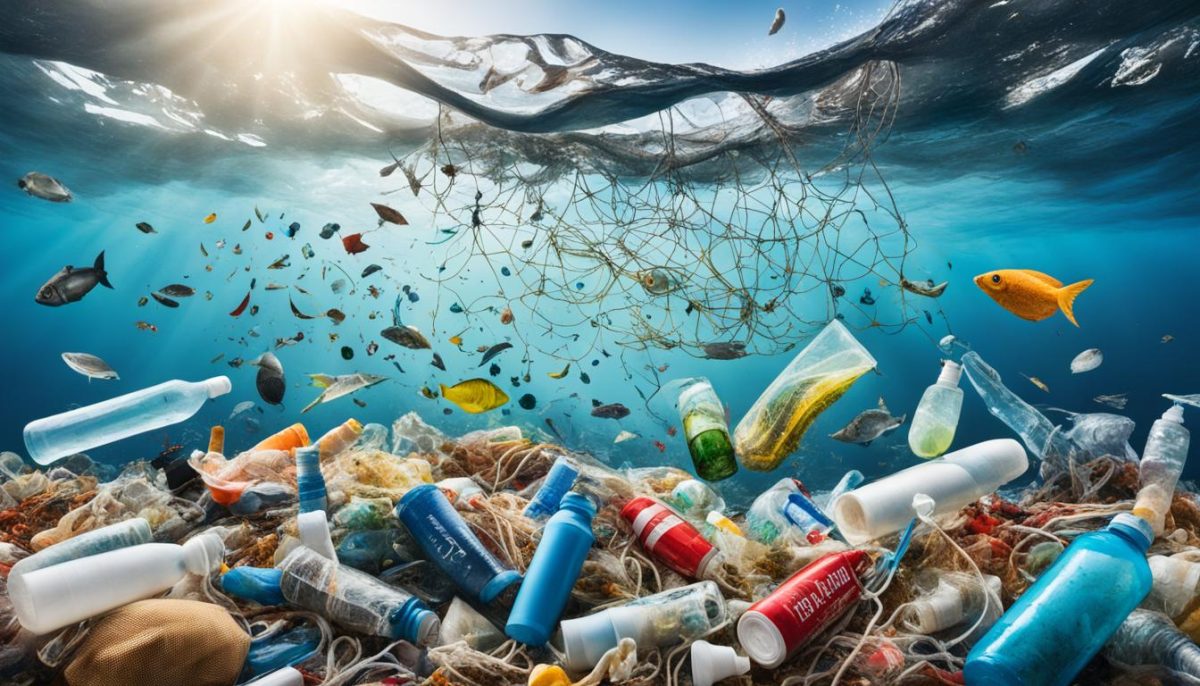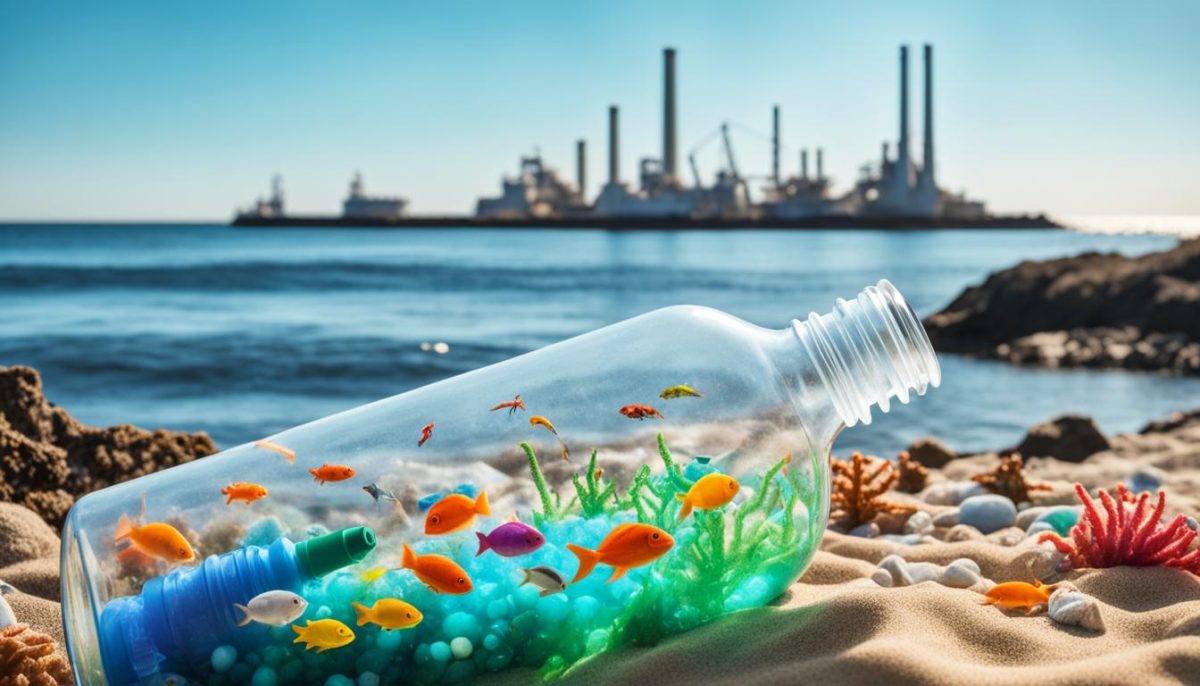
Welcome to our article series on the G20 Action Plan on Marine Litter. In this series, we will explore how this plan addresses the issue of marine litter and the role of product stewardship in achieving sustainable oceans. The G20 Action Plan on Marine Litter is a comprehensive roadmap that outlines strategies and targets to reduce marine debris and protect our precious ocean ecosystems.
Marine litter, consisting of plastic waste, fishing gear, and other debris, poses significant environmental and economic challenges. It threatens marine life, damages ecosystems, and harms the livelihoods of coastal communities. To combat this urgent issue, the G20 nations have come together to develop a collaborative plan that emphasizes the importance of individual and collective action.
Product stewardship plays a crucial role in the G20 Action Plan on Marine Litter. It recommends the introduction of product stewardship strategies to ensure responsible and sustainable production and consumption. Product stewardship involves taking responsibility for the entire life cycle of a product, from design and production to disposal, to minimize its impact on the environment.
By implementing effective product stewardship measures, such as recycling initiatives and extended producer responsibility programs, we can significantly reduce the amount of waste that ends up in our oceans. This proactive approach not only helps protect marine ecosystems but also contributes to the creation of a circular economy that maximizes resource efficiency and minimizes waste.
Join us in the following sections as we dive deeper into the G20 Action Plan on Marine Litter, explore the significance of product stewardship, and discuss the practical aspects of implementing this crucial plan. Let’s work together towards the preservation of our oceans for current and future generations.
Understanding the G20 Action Plan on Marine Litter
The G20 Action Plan on Marine Litter is a comprehensive framework designed to address the growing problem of marine debris and promote the conservation of our oceans. The plan sets out key objectives, targets, and strategies that G20 nations are committed to implementing in order to achieve sustainable oceans.
At the heart of the G20 Action Plan is the recognition that marine litter poses a significant threat to marine ecosystems, biodiversity, and human livelihoods. It acknowledges the urgent need for collective action and international collaboration to prevent and reduce marine debris.
Key Objectives
- Foster awareness: The plan aims to raise global awareness about the impact of marine litter and the urgent need for action.
- Promote research and innovation: G20 nations are committed to supporting research and innovation that will contribute to the development of effective solutions to tackle marine litter.
- Strengthen waste management systems: The plan emphasizes the importance of improving waste management practices, including collection, sorting, recycling, and proper disposal.
- Encourage sustainable production and consumption: G20 nations will work towards promoting sustainable production and consumption patterns to minimize the generation of marine litter.
- Enhance international cooperation: The plan emphasizes the need for international cooperation to share knowledge, resources, and best practices in addressing marine debris.
The G20 Action Plan on Marine Litter also sets clear targets to guide the progress and success of its implementation. These targets include reducing the input of marine debris into the oceans, promoting the sustainable management of plastic waste, and enhancing scientific understanding of the sources, pathways, and impacts of marine litter.
Strategies for Success
Implementing the G20 Action Plan requires the adoption of various strategies to effectively tackle marine litter. These strategies include:
- Policy and regulatory measures to promote sustainable waste management practices and reduce single-use plastics
- Investment in infrastructure and technologies that enable efficient waste collection, recycling, and disposal
- Raising awareness through education and public outreach campaigns to foster behavioral change and responsible consumption
- Strengthening international collaboration through partnerships and knowledge sharing to develop innovative solutions and best practices
By aligning their efforts and commitments, G20 nations are working together to combat marine litter and create sustainable solutions that will safeguard the health and resilience of our oceans for future generations.
Through the G20 Action Plan on Marine Litter, we have an opportunity to make a significant impact in protecting our oceans and ensuring their sustainability. By understanding the plan’s objectives, targets, and strategies, we can all play a part in creating a cleaner and healthier marine environment for ourselves and the generations to come.
The Role of Product Stewardship in the G20 Action Plan on Marine Litter
Product stewardship plays a crucial role in the G20 Action Plan on Marine Litter. It is an approach that involves the collective responsibility of producers, consumers, and other stakeholders to minimize the environmental impact of products throughout their lifecycle.
By implementing product stewardship practices, we can effectively reduce marine litter and promote sustainable oceans. This approach focuses on preventing waste generation, encouraging recycling and reuse, and ensuring proper disposal of products to prevent them from entering our marine ecosystems.
Product stewardship is essential in achieving the goals set by the G20 Action Plan on Marine Litter. It addresses the root causes of marine litter by targeting the design, production, usage, and end-of-life management of products. By adopting sustainable production practices and designing products with recyclability and resource efficiency in mind, we can significantly reduce the amount of waste that ends up in our oceans.
Effective Product Stewardship Strategies
Several effective product stewardship strategies can be implemented to support the goals of the G20 Action Plan on Marine Litter:
- Extended Producer Responsibility: This strategy holds producers accountable for the lifecycle management of their products, including collection, recycling, and proper disposal. By shifting the responsibility to producers, it encourages them to design products that are easier to recycle and dispose of responsibly.
- Education and Awareness: Raising awareness among consumers about the importance of responsible consumption and disposal can significantly reduce marine litter. Educational campaigns, labeling initiatives, and consumer guides can help promote sustainable choices and behaviors.
- Circular Economy: Adopting circular economy principles, such as promoting reuse and recycling, can reduce waste generation and minimize the demand for new raw materials. Recycling and repurposing products can help conserve resources and prevent marine litter.
- Innovation and Research: Investing in research and innovation can lead to the development of new technologies and materials that are more sustainable and less harmful to marine ecosystems. Encouraging research collaborations and funding projects focused on marine litter can drive positive change.

Final Thoughts
Product stewardship plays a vital role in the G20 Action Plan on Marine Litter as a comprehensive strategy to address the issue of marine pollution. By implementing effective product stewardship strategies, we can minimize waste generation, promote sustainable consumption and production, and safeguard our oceans.
As we strive towards a future with clean and healthy oceans, it is crucial for governments, industries, and individuals to embrace product stewardship and take collective action in reducing marine litter. Together, we can create a more sustainable and resilient environment for future generations.
Implementing the G20 Action Plan on Marine Litter
Implementing the G20 Action Plan on Marine Litter is a crucial step towards addressing the pressing issue of marine litter. While the plan provides a comprehensive framework to combat marine debris, its successful implementation presents both challenges and opportunities.
The primary challenge lies in coordinating the efforts of various G20 nations and ensuring their commitment to the action plan. To effectively tackle marine litter on a global scale, international cooperation and coordination are essential. This involves establishing strong partnerships, sharing best practices, and fostering collaborative initiatives.
Another challenge centers around the diverse nature of marine litter and its sources. From plastics to microplastics, fishing gear to abandoned vessels, addressing the different components of marine litter requires a multi-faceted approach. G20 nations must implement strategies that target not only the prevention but also the removal and recycling of marine debris.
Amidst these challenges, there are also significant opportunities to be leveraged. Implementing the G20 Action Plan on Marine Litter can result in cleaner oceans, healthier ecosystems, and more sustainable economies. By adopting innovative technologies, investing in research and development, and promoting green practices, G20 nations can pave the way for a cleaner future.
The successful implementation of the action plan is expected to yield positive outcomes. By reducing marine litter, we can protect marine life, preserve biodiversity, and safeguard human health. Furthermore, addressing marine litter presents economic benefits, including job creation in waste management and recycling sectors.
To ensure the effective implementation of the G20 Action Plan on Marine Litter, continued monitoring, evaluation, and reporting are paramount. Regular progress assessments will allow for necessary adjustments and improvements in strategies, ensuring that G20 nations stay on track towards a sustainable ocean future.
Conclusion
In conclusion, the G20 Action Plan on Marine Litter plays a vital role in addressing the pressing issue of marine litter and promoting sustainable oceans. The plan recommends the introduction of product stewardship as a key strategy to combat marine debris and protect our ocean ecosystems.
Product stewardship is a holistic approach that emphasizes the shared responsibility among manufacturers, consumers, and governments to reduce the environmental impact of products throughout their lifecycle. By implementing effective product stewardship measures, such as recycling programs, extended producer responsibility, and eco-design, we can minimize the amount of waste that enters our oceans.
It is essential for G20 nations and international stakeholders to collaborate in implementing the action plan and ensuring its success. By working together, we can develop innovative solutions, share best practices, and create a global framework for managing marine litter. By harnessing the power of product stewardship, we can pave the way for cleaner, healthier oceans for future generations.
